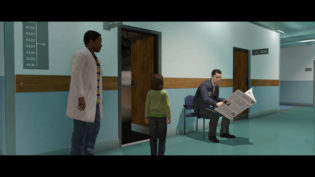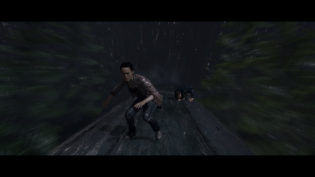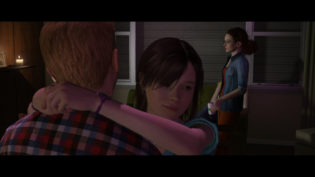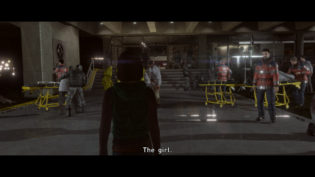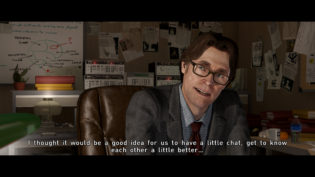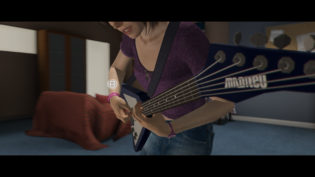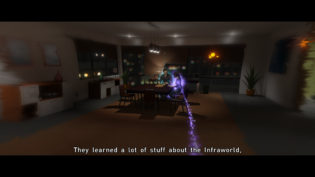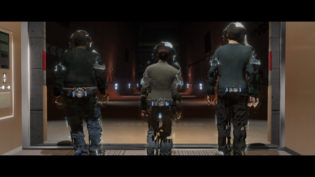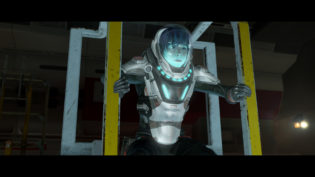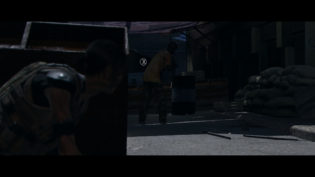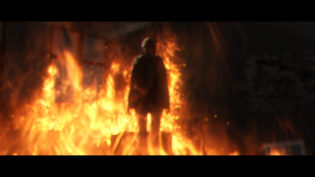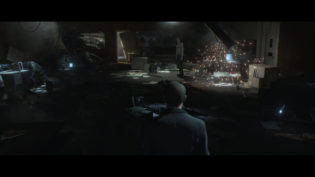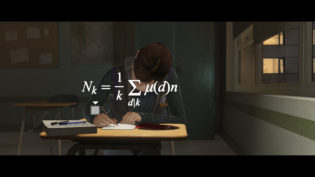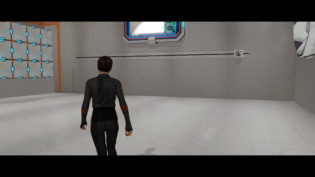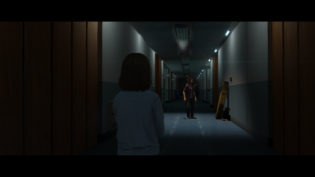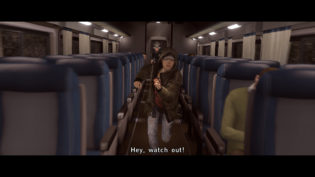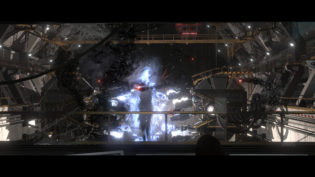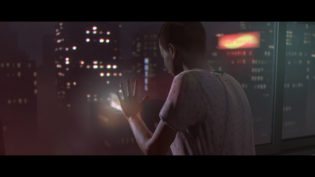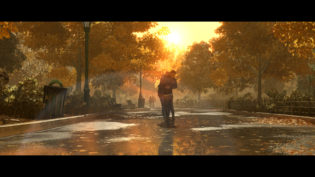Among all of the titles that Quantic Dream worked on, I knew the least about Beyond: Two Souls. It got some buzz around it due to very high profile actors before release, yet after the game was out not a lot of people seemed to care much about it. Even the biggest Quantic Dream fanboys seemed to be more excited about the potential for more Fahrenheit or Heavy Rain, or were raging about how good Detroit is. Heck, even a potential sequel to Omikron seemed more exciting to people then talking about Beyond. Granted, maybe that was only in the parts of the internet that I’ve frequented as it seems that the game actually won some awards on release and had quite a few positive reviews. Yet, all I knew about it was that it was somewhat passable and not particularly interesting, and that it had William Dafoe and Elliot (then Ellen) Page in main roles.
And now that I’ve finally had a chance to play it for myself, I can kinda see why it had this weird reception. It’s… something. But not as something as the more popular games from the studio.
So, just as every single game from Quantic Dream ever since Fahrenheit, Beyond: Two Souls is an “interactive fiction” game that plays like a mix of a movie with lots of quick-time events and some third person perspective action adventuring. And just like all of them (at least up until this one, as I’ve yet to play Detroit) the controls in this game are… different from what is typically used in games. As before, most of the interactions are done not with the face buttons on the controller, but rather with motions on the right analogue stick, though this implementation of the idea is the worst one yet, but more on that later. Also common for their titles is a segmentation of the game into chapters, not unlike movie chapters, where choices you make might affect the subsequent events of the game.
The main “gimmick” of Beyond is the presence of an Entity named Aiden tied to our main character Jodie that essentially gives her (or rather him, usually upon her request) special powers like telekinesis or reading the past events from people or items. As such, you often have an option to press a button and become this entity, who has his own way of interacting with the world, and many of the problems in the game are solved by the pair working together. While it feels like a really cool idea and is originally presented as this wonderful fully controllable floating ability, as the game goes on, the ability to play as Aiden becomes incredibly limited and often frustrating due to how terrible the controls are. And sometimes, against the narrative or gameplay logic, the ability to switch to Aiden is simply disabled because of some reasons.
But let’s return to the issue of controls in the game, because somehow Quantic Dream managed to devolve them with each next title. What was novel (if often silly) and quite easy to understand in Fahrenheit, because every action was clearly labeled, became harder to understand in Heavy Rain, because the motion prompts were placed in some general vicinity of an object to interact with, sometimes leading to completely unexpected results. But Beyond: Two Souls goes even further and simply places some vague dots near objects that you interact with by pressing the right stick towards them. All while: a) keeping the control of the camera still tied to the same stick leading to constant accidental interactions despite most of the buttons being unmapped and b) sometimes the camera rapidly changes as it waits for the interaction yet only one of the directions is considered correct to start the interaction and you have to simply guess which one.
In addition to that if you play on the default difficulty, the game doesn’t actually tell you the directions you must press in QTE segments and you have to just guess them based on the animations. Which is especially hilarious since the action sequences with QTEs constantly break the 180 degree rule almost mid-interaction so understanding the intended directions is even harder. And in addition to that, lots of these segments contain some sort of automated movement, but some don’t and require you to move. And there’s absolutely no tell. What’s amazing about this is that the “easier difficulty”, which I recommend switching to if you value your sanity (while being insane enough to choose playing this game), is called “I don’t play games often”, even though what it does is shows what buttons to press in this completely context-sensitive button game, which is what other games actually do because they know that expecting players to just “know” what your hidden intent with button presses was, that changes with every next scene, is simply disrespectful.
Yet, people tend to be attracted to Quantic Dream titles for their “cinematic stories” and I must say that Beyond: Two Souls might be their best attempt yet (again, I’ve not played Detroit at the moment of writing this). It’s not great, in fact it’s not good, but it’s considerably better done than whatever they’ve attempted before. There’s more consistency in characters, more actual story-telling instead of the game being just a collection of barely related scenes and episodes, more of a central theme. Don’t get me wrong here, there’s still a fair amount of ridiculous, tone deaf moments, obnoxiously long episodes that barely have to do with anything at all and idiotic character writing. And the very-very end of the game almost gets to the levels of stupidity on the level of Fahrenheit. But it’s more consistent and… fine.
Which, ironically, is somewhat to the detriment of the game. Omikron tried to be many things at once, just like this game, and also failed, but it was far more ambitious and still has some unique ideas in its non-linearity. Fahrenheit still has some of the best opening parts to any games and by the end becomes such a fascinating train wreck that it’s hard to avert eyes. Heavy Rain is a mix of idiocy and some genuinely memorable moments and this almost surreal mix of elements makes it interesting. But Beyond: Two Souls has some nice gameplay ideas, some nice segments, some nice acting, and some stupid elements, but most of it is just “okay”. Never absolutely horrible, even when it desperately wants to be a stealth game and fails. Never memorable either. It’s very reminiscent of Omikron, in that this constantly feels like a game that could be good, but just isn’t (and also thanks in many ways to its controls). Yet, if I’m honest, I’d rather see Omikron remade or continued than this.
There are some absolutely bizarre decisions as well. The narrative, for example, is told in fragments that are told out of order. Which does help the story in that it creates mini-mysteries out of otherwise insignificant “revelations”, yet it’s clearly a crutch, because without it the story would be even less interesting. Yet, for whatever reason, the PS4 and PC version of the game allow you to play the game in the chronological order. Probably because the reviews criticized it and the studio thought that this is the solution? I haven’t tried it, but I doubt that it’d make the story more interesting instead of less. Also there was a DLC for the game that is included with the PS4 and PC releases, that is an attempt to make the game work like a puzzle game with a Portal-like vibe. Yet it doesn’t really work and also it’s clear that the actors weren’t involved at all, so seeing the digital body of Elliot Page smile to some terrible writing in this cash grab of a DLC felt kinda disgusting.
Beyond: Two Souls is a really strange game to talk about. I cannot in good faith recommend playing it, because the playing part is absolutely terrible, the worst out of everything Quantic has done, including Omikron. Yet, I feel like watching someone play this isn’t going to be that interesting either, unlike their previous titles which are fun to watch. But at the same time, it feels like a game that had the most potential to be really good out of them. If it wasn’t written by people who can’t write for crap, if the controls were made with humans in mind, if it was shorter and tighter this could’ve actually been a solid game. Heck, at times it felt like Life is Strange 2 was basically ripping this game off and, somehow, often for the worst and people like that one. Speaking of which, it must be noted that this is the game where Quantic saw the popularity of Telltale’s The Walking Dead and decided to show the choices outright at the end of each chapter, something every game of this sort seems to do lately. Anyways, it’s hard to recommend this game, but I cannot really not recommend it at all either. It’s not fun to play and is kinda boring to watch, but it could’ve been something. It wasn’t, but it could’ve been.


